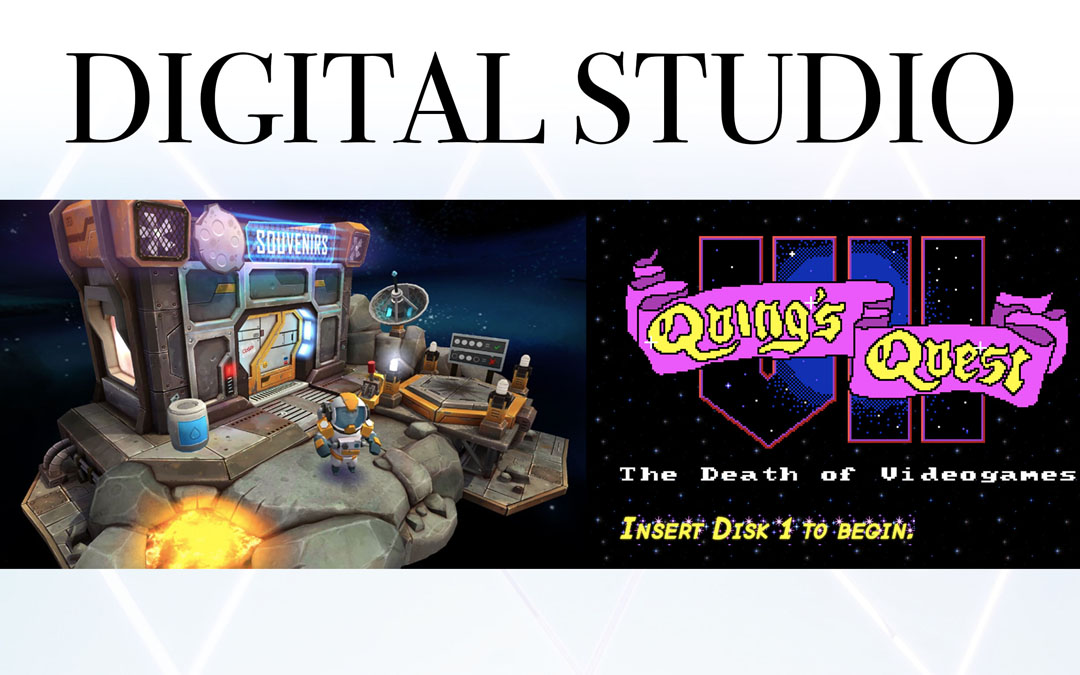What is electronic literature? E-lit, or digital literature, is a genre of literature encompassing works created and read on the computer, tablet, mobile phone or other electronic device. Authors have been experimenting with the computer as a writing machine since the invention of the computer, and each new innovation in computational technologies inspires innovations in born-digital literature.
This fall SDSU’s Digital Humanities Initiative is partnering with arc, a California-based company dedicated to working with students to help emphasize learning through experience, to create an after-school curriculum on electronic literature. The pilot program, called Digital Studio, aims to bridge the digital humanities between the university and local high schools and to provide teaching opportunities for SDSU students interested in experimental literature.
The curriculum was designed by Tina Lumbis, a graduate student in the MFA program in SDSU’s English and Comparative Literature Department, with Professor Jessica Pressman (English and Comparative Literature and Co-Director of SDSU’s Digital Humanities Initiative). Graduate students Brenda Taulbee (MFA in SDSU’s English and Comparative Literature Department) and Katie Chestnut (Education) are leading the in-classroom instruction. Students at four regional high schools–Mission Bay High School, Lincoln High School, Hoover High School, and School of Creative and Performing Arts–will learn about born-digital literature, will create multiple digital projects, and will show off their hard work and creative efforts at an exciting showcase in SDSU’s new Digital Humanities Center on November 7 at 4pm!
Here are a few words from the graduate student members of our team on why they’re excited to be working with the program:
Being a part of this program is so special and important to me for many reasons. With it, I have the opportunity to introduce high school students to a form of literature with which I have had a complex relationship. Not only do I get to introduce the students to digital literature as a concept, I get to support them as they learn how to utilize this form to tell their own stories. Digital literacy is something in which I think all students need to be instructed. Our course, Digital Studios, begins their instruction in a vital field in an engaging, empowering manner. On a selfish note, by being a part of Digital Studio, I get to work with the very talented pool of people who organized this program.
For me, it is incredible to see how the innovation that is becoming accessible through digital and e-literature is opening up entirely new genres and definitions of what it means to be literature, as well as who can produce it. This program, with ARC and the Digital Humanities Initiative, is giving students a chance to experience and create powerful works through which they can find and shape their personal voice—an experience I wish I would have had in my own pre-college academic career.
I wanted to be involved with the pilot program because I feel that ARC and the Digital Humanities Initiative are opening new avenues for a generation of voices, viewpoints and experiences to enter the literary conversation on their own terms, rather than trying to charm or sneak past academia’s old-guard gatekeepers. Electronic literature allows students to repurpose, reimagine, and redesign what literature is and how it serves them, an act of agency that is vital to the future of the field.
Too often conversations depict digital as a negative thing–as if the digital is replacing traditional texts and that that means the end of reading. I feel like this is not only untrue, but also harmful. There are amazing pieces of electronic literature out there that don’t replace previous works but instead add to a rich literary tradition. Having the opportunity to share these works with high-school students while also showing them how to create their own digital works is extremely rewarding. I hope students get excited by these pieces and find new ways to express themselves through various types of digital and traditional creation.
Over the coming weeks we will regularly update our blog with information about the ongoings in the after-school classrooms as well as post examples of student work. We are excited for the opportunity to work with local high school students and to explore the digital world of literature together!
– Jared Zeiders

